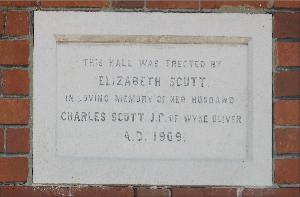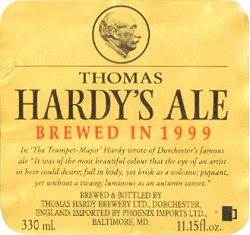Several farm labouring families seem to have lived and worked in Preston and Sutton Poyntz for many generations, appearing in all the censuses available, parish registers, tithe apportionments, surveys etc. etc. Although families' ties to the soil have all but disappeared, many of these families can still be found in the locality. Some of the names that crop up again and again are: Willshire (a Willshire had found a horde of coins here some time in the early 19th Century); Puckett (numerically the largest family in the village for most of the 19th Century; two were innkeepers at the Spring Bottom Pub); Burt (a common Dorset name, one was innkeeper at the Butcher's Arms); Miller; Galpin; Thorne; Squibb.
|
Plaque on the Scutt Memorial Hall |
Scutt
Three Scutts arrived to farm in Preston and Sutton Poyntz in about 1829. They were, we believe, sons of a farmer in Affpuddle, John Scutt. Two of the brothers, Robert and Thomas, farmed at Sutton Farm until their partnership ended in 1849. Robert continued to live in Sutton Poyntz until his death in the 1870's; his son Robert was a miller for a short time, and lived in Preston until some time in the 1880's. (N.B. Another Robert Scutt, shown in the 1841 Census as a dairyman, was probably not closely related).
The third brother John farmed Jordan Farm from 1829 until his death in the early 1870's. John passed the tenancy of Jordan Farm on to his son Charles, who later moved to Wyke Oliver Farm. Charles died in or shortly before 1909; his wife Elizabeth erected the Scutt Memorial Hall, which is owned and used by the Scouting organisations. Charles's son Edward Angus continued to farm at Jordan Farm for some time afterwards, at least to 1925.
|
Thomas Hardy Ale, brewed by Eldridge Pope |
Pope
After Robert and Thomas Scutt stopped farming in 1849, a farmer called John Allen Pope moved from Clifton Maybank in north Dorset to farm at Sutton Farm. He was originally from Toller Porcorum, but had moved to Clifton Maybank in 1837. For a time, he farmed most of the manor of Sutton Poyntz, a massive total of 1950 acres; the farm was divided in about 1867 between himself and one of his sons, Henry, who farmed Northdown Farm. After John's death in 1875 another son, Thomas, took over for a short time at Sutton Farm. Later another Pope, Bernard, took over for a short time; he was a grandson of John Allen Pope's younger brother Thomas.
John Allen Pope had 7 sons and 4 daughters. The two most significant of these siblings were Alfred and Edwin. They did not take up farming, but in 1870 bought into a Dorchester brewery, then called Eldridge, Mason & Co, but quickly renamed as Eldridge Pope. In 1879 they bought and developed the brewery site next to Dorchester South station, and rapidly developed the business. A third brother, George, joined the business (now floated as Eldridge Pope & Co Ltd) in 1899.
Some time (we believe during the Pope family's time at Sutton Farm), the farmhouse was considerably 'gentrified', with a lake built in the garden. To enable this, Puddledock Lane was re-routed - originally it went to the north of the farmhouse (so that it came out into the village more or less opposite the entrance to Silver Street). Since, Puddledock Lane has passed between the farmhouse and the stream; this has drastically altered the simple cross-roads shape that the village originally had. The farmhouse seems to have been called "The Elms" for a time, but this name has disappeared.
Saunders
Henry Pope farmed at Northdown Farm for a time, roughly from 1867 to 1885; he then (we think - frustratingly the evidence from Censuses and Directories is patchy) replaced his brother Thomas at Sutton Farm. After him, Northdown Farm was farmed by William Keynes for a time, and then William Macey. Some time around 1905, Leonard Saunders arrived to farm at Northdown. He was originally from Marchwood near Southampton, but had farmed at Hardington in Somerset and then at Wynford Eagle. Leonard died quite young, in about 1915, but the farm continued to be farmed by his widow Harriett and their children. In 1925 the Saunders family took the opportunity of buying their farm from the Weld Estate, along with the farm labourers' cottages by the pond. Eventually the farm was taken over by one of Leonard and Harriett's sons, Ernest.
Ernest had twin sons, Derek and David, and a daughter Elizabeth. They continued to farm Northdown until 1992, when Ernest died and the family decided to sell up. David and Elizabeth continued to live in the village - David has given us some family reminiscences. As we have noted above, this farm sale ended all ties between the people of Sutton Poyntz and food production.
Harrison
The 1861 Census shows a Harrison family at East Coker, near Yeovil; Thomas Harrison, a carpenter, his wife and 6 children, all born at East Coker. By 1871, their 17 year-old son, William, had moved to Weymouth and was living with his aunt and apprenticed as a carpenter to his uncle, John Player. William met and married a girl from Preston, Jemima (almost certainly Jemima Jael Butler, daughter of Henry and Ann Butler, and grand-daughter of William and Eliza Fancy, bakers and shopkeepers in Preston. William Harrison moved to Preston, and William and Jemima then moved to Sutton Poyntz where he set up a joinery and wheelwright business.
William and Jemima had 5 sons, William, Edward, Frederick, Walter and Herbert, and 2 daughters, Emily and Elizabeth. During the 1st World War, it is said that two of the sons, including Walter, went to Braintree in Essex, to work at the Crittall Windows factory which had been converted to a munitions factory. Apparently Walter and one of his brothers both married girls from Essex, but we don't know if this was coincidence. Walter and Herbert stayed in the village, doing carpentry and also some house building. Walter's son, John, and a cousin Joan both lived in Sutton Poyntz until very recently, but they have both sadly died, leaving John's widow as the only Harrison in the village.


